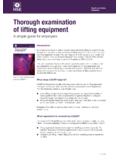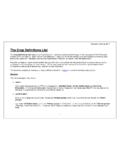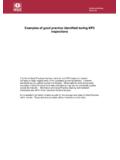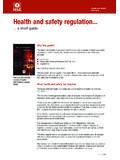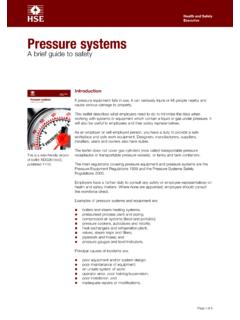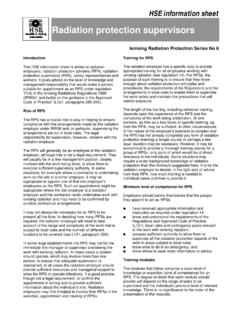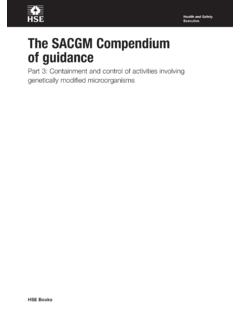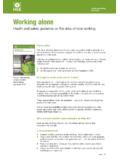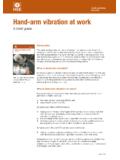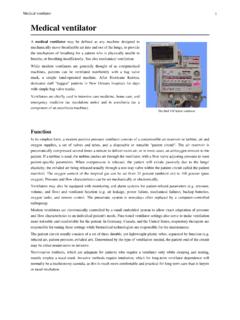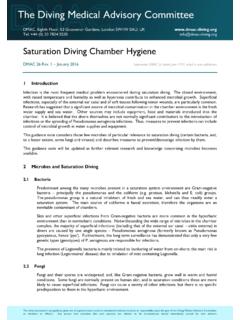Transcription of Time to treatment for decompression illness
1 Health and Safety Executive Time to treatment for decompression illness Prepared by North Sea Medical Centre for the Health and Safety Executive 2007 RR550 Research Report Health and Safety Executive Time to treatment for decompression illness Dr Werner Stipp North Sea Medical Centre 3 Lowestoft Road Gorleston on Sea Great Yarmouth Norfolk NR 31 6SG hyperbaric oxygen treatment (HBO) is the standard and definitive treatment for divers with decompression illness (DCI). There is conflicting evidence in the medical literature on whether DCI is more responsive to early rather than late treatment with hyperbaric oxygen (HBO). The main aim of this study is to investigate the influence of time to treatment with HBO in divers with neurological DCI. Here we show that early HBO treatment in divers with neurological DCI is robustly associated with a better outcome. There is a suggestion in this study that divers with DCI are less responsive if HBO treatment is delayed for 350 minutes or more (or approximately six hours) after surfacing from the incident dive.
2 An interesting observation in this study is that if normobaric oxygen is administered before HBO, it tends to protect divers against delay in treatment with HBO. An additional analysis provides medical evidence that time limits for HBO as specified in the current ACOP1 should remain in place. This study recommends that a time to treatment action plan (TTT action plan), which specifies what to do when a diver develops suspicious DCI symptoms, will help to ensure that divers have prompt HBO treatment . Divers with serious DCI should be given the appropriate level of medical care in a hospital setting. This report and the work it describes were funded by the Health and Safety Executive (HSE). Its contents, including any opinions and/or conclusions expressed, are those of the authors alone and do not necessarily reflect HSE policy. 1 ACOP: Approved Code of Practice for Commercial Diving Projects for Inland/Inshore Diving (1998) under the Diving at Work Regulations 1997 HSE Books Crown copyright 2007 First published 2007 All rights reserved.
3 No part of this publication may be reproduced, stored in a retrieval system, or transmitted in any form or by any means (electronic, mechanical, photocopying, recording or otherwise) without the prior written permission of the copyright owner. Applications for reproduction should be made in writing to: Licensing Division, Her Majesty s Stationery Office, St Clements House, 2-16 Colegate, Norwich NR3 1BQ or by e-mail to ii EXECUTIVE SUMMARY hyperbaric oxygen treatment (HBO) is the standard and definitive treatment for decompression illness (DCI). HBO involves the delivery of 100% oxygen inside a treatment chamber at a pressure of more than one atmosphere. Normobaric oxygen means administration of 100% oxygen at atmospheric pressure with tight fitting mask, ideally with a reservoir bag or a demand system, to a patient (diver). Normobaric oxygen should never be regarded as a substitute for HBO in divers with DCI.
4 There has been some debate regarding the relative importance of speed vs. quality of treatment for divers with decompression illness (DCI) arising from diving at work operations. Although there is consensus amongst diving doctors that there is no substitute for quality supportive medical care in a seriously injured diver, there is conflicting evidence in the medical literature on whether DCI is more responsive to early rather than late treatment with hyperbaric oxygen (HBO). The main aim of this study was to investigate the influence of time to treatment with HBO in divers with neurological DCI. The Health and Safety Executive s Approved Code of Practice (ACOP) for Commercial diving projects inland/ inshore under the Diving at Work Regulations, 1997 provides guidelines regarding the availability of hyperbaric chambers to ensure prompt treatment in the event of a diver developing DCI. The guidance states that a compression chamber should be within 2 hours travelling distance for dives over 10 and up to 50 metres with either no planned in-water decompression ; or with planned in-water decompression of up to 20 minutes.
5 For inland/ inshore diving with no planned in-water decompression , and if the diving depth is less than 10 metres, the ACOP states that the compression chamber should be within 6 hours travelling distance from the diving site. For dives with planned in-water decompression greater than 20 minutes, a compression chamber is required on site. Firm medical evidence is needed to allow the HSE to review, and if necessary amend the current guidance in this area. This study provides evidence that early HBO treatment in divers with neurological DCI is associated with a better outcome. An additional analysis evaluating the current ACOP provides evidence that divers who are compliant with the ACOP, divers with DCI having HBO within the time limits specified above (see above), have a better outcome when compared to divers who are non compliant. This study therefore provides medical evidence that the time limits as specified in the current ACOP should remain in place.
6 An interesting observation in this study is that normobaric oxygen administered to the diver before HBO tends to protect the diver against a delay in treatment with HBO. There is a suggestion in the analysis of this study data that divers with DCI who did not receive normobaric oxygen are less responsive to HBO treatment after 350 minutes (or approximately six hours) of surfacing from the incident dive. Diving contractors and diving supervisors, professional and amateur divers, as well as medical staff, need to be informed and educated on the importance of early hyperbaric oxygen treatment in divers with DCI. iii The author recommends that a revised ACOP should re-emphasize the importance of administering normobaric oxygen in divers who develop symptoms and signs suggestive of DCI. Of note is that HBO gives complete resolution of DCI in the majority of DCI cases (relatively few divers had residual symptoms or signs of neurological DCI after all HBO sessions).
7 Prompt HBO will result in earlier resolution of DCI symptoms and signs. Knowledge of symptoms and signs of the illness in amateur and professional divers are important, but according to research are not sufficient to change patient behaviour to ensure that patients seek specific treatment at an early stage. A well laid out time to treatment action plan (TTT action plan) on what to do when a diver develops suspicious symptoms will be more effective in ensuring divers seeking prompt HBO treatment . It is recommended that a TTT action plan should be included in each diving plan. Transport arrangements need to form part of a TTT action plan. The questionnaire used in this study could form the basis of the development of a clinical diving incident reporting system to the HSE which could be undertaken by doctors with medical responsibility for diving operations. Such a reporting system may help the HSE to identify diving operations/ practices that have a high incidence of DCI (and a poor response to HBO treatment ) which in turn could be used to initiate preventative action.
8 The time taken to HBO treatment could be included in each incident report. Further research is necessary to identify divers who are more susceptible to DCI at the pre-employment medical. iv CONTENTS 1. BACKGROUND 1 Study objectives. 2 Time to treatment with hyperbaric oxygen (a therapeutic diving table) and quality of hyperbaric treatment , a literature review. 2 2. STUDY DESIGN. 7 Study design 7 Collection of data 7 i. The study questionnaire 7 ii. Inter rater agreement 8 3. RESULTS 9 Assessment of Inter-Rater Agreement 9 Description and Exploration of the Data 12 Conformation to current guidelines 14 General modelling in terms of time to HBO treatment 17 4. DISCUSSION 21 5. CONCLUSIONS 24 6. RECOMMENDATIONS 25 7. REFERENCES 26 APPENDIX 1 Questionnaire administered by the investigators in this study. 28 v ACKNOWLEDGEMENTS Dr Nick McIver for his advice and support throughout the project. Dr Phil Bryson, Marguerite St Leger Dowse and the Team at DDRC for their excellent work.
9 The Directors of Abermed, Phil Smith and James Miller for their support. Dr Andrew Lynch of Cambridge University Technical Services Ltd for statistical advice. vi 1 1. BACKGROUND The UK Health and Safety Commission (HSC) and the Health and Safety Executive (HSE) are responsible for the regulation of risks to health and safety arising from work activity in Britain. The objective of this work was to provide medical evidence to uphold the mission of the HSC and HSE, which is to ensure that the risks to people s health and safety from work activities, in this instance from diving activity at work, are controlled. An adverse health effect of diving activity is development of acute decompression illness (DCI). Neurological DCI could result in permanent disability or loss of function. It is therefore extremely important to provide a scientific evidence base of the influence of factors that could prevent divers from developing decompression illness and eliminating/ minimizing the consequences of DCI in a diver once the symptoms and signs are present.
10 There is conflicting evidence in the medical literature on whether DCI is more responsive to early rather than late treatment with HBO4-13. There has also recently been debate regarding the relative importance of speed versus the quality of treatment for DCI. The ideal statistical model that investigates time to HBO will also incorporate other treatment modalities such as IV fluids and normobaric oxygen administration as these may give indications on the relative importance of speed vs. quality of treatment . The Health and Safety Executive s Approved Code of Practice (ACOP)1 for Commercial diving projects offshore under the Diving at Work Regulations, 1997 states that an on-site hyperbaric chamber should be available for offshore diving operations. The Approved Code of Practice (ACOP) for commercial diving projects inland/ inshore2 states that a compression chamber should be within 2 hours travelling distance for dives over 10 and up to 50 metres with either no planned in-water decompression ; or with planned in-water decompression of up to 20 minutes.
